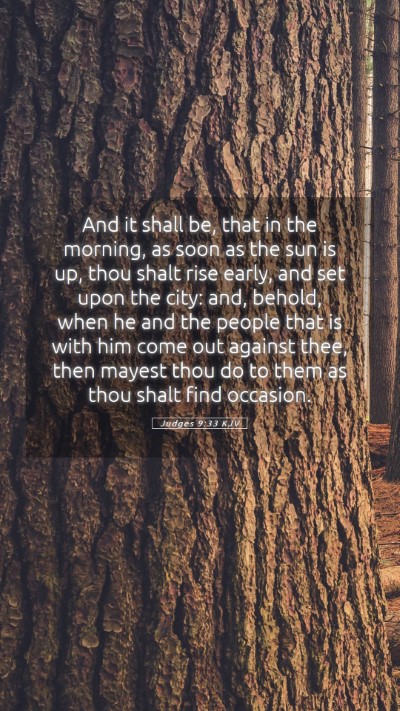Bible Verse Meaning and Interpretation for Judges 9:33
Judges 9:33: "And it shall be, that in the morning, as soon as the sun is up, thou shalt rise early, and set upon the city; and, behold, when he and the people that are with him come out against thee, then mayest thou do to them as thou shalt find occasion." (KJV)
Overview of Judges 9:33
This verse is part of the account of Abimelech, the son of Gideon, who sought to establish his rule over Shechem. The counsel given indicates a strategic plan to attack when the enemy is least prepared, highlighting themes of treachery and the pursuit of power.
Interpretation and Insights
The interpretation of Judges 9:33 reveals a multifaceted understanding of its implications within the narrative of the Book of Judges.
- Strategic Warfare: Commentators like Matthew Henry note the cunning involved in Abimelech's approach. The timing of the attack at dawn when enemies are least alert illustrates the shrewdness often employed in battle.
- The Role of Deception: Adam Clarke emphasizes the deceptive nature of Abimelech’s leadership. His rise to power is marked by manipulation and betrayal, showcasing the moral complexities in leadership roles.
- Divine Judgment: Albert Barnes discusses the theological implications, suggesting that such underhanded tactics are often reflective of divine judgment upon a people who have strayed from God’s ways, leading to internal conflict and strife.
- Leadership Lessons: Lessons on leadership and personal integrity can be drawn, as this narrative exposes the consequences of deceitful governance.
- Historical Context: Engage with the historical backdrop of the Israelite judges, exploring how political fragmentation and moral decay can emerge in societies distancing themselves from divine principles.
Applications of Judges 9:33
Understanding this verse encourages readers to reflect on their own lives and the leadership they choose to follow or embody.
- Evaluating Leadership: Ask critical questions about the leaders you support—are they honest and trustworthy, or do they exhibit cunning and deceit?
- Personal Accountability: This narrative challenges individuals to aspire to uprightness in their personal and communal dealings, recognizing the importance of integrity.
Cross-References
- 1 Samuel 15:23 - Discusses rebellion and how it is viewed as sin.
- Proverbs 28:16 - Touches on the folly of leaders who are corrupt.
- Ezekiel 34:2-4 - A critique of the shepherds of Israel and their failures.
Conclusion
The exploration of Judges 9:33 offers rich insights into the dynamics of power, deception, and the responsibilities of leadership. In doing so, it encourages a deeper study of Scripture and its applications to modern life, thereby enhancing our bible study insights and understanding of God's Word. It also presents opportunities for bible study groups to dive deeper into themes of justice and integrity.


